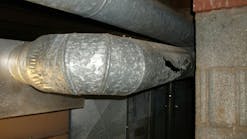It has been said that you can tell a craftsman by his tools. And with the increasing sophistication and complexity of modern heating and cooling systems, ensuring that your craftsmen — your company's technicians — have the right tools has become more important than ever.
The means by which a company equips its technicians has changed over the years. It used to be fairly clear-cut that technicians either supplied their own tools, were given a tool allowance, or were supplied with tools purchased by the company. Today, because of the cost and complexity of the diagnostic instruments that technicians need, many companies are using a combination of those methods.
"The bottom line is that in order to properly, install, troubleshoot, commission, test, and balance an HVAC system, technicians need the right tools," says Tom Spall, president, T.E. Spall and Son, Carbondale, PA. "We require our co-workers to have certain tools of their own, while the company provides the more expensive and specialized tools. When new or existing co-workers don’t have all the required tools for their position, the company will help them by purchasing the tools and allowing them to make payments."
Spall's lists of company-supplied and technician-supplied tools are available at bit.ly/coworkertools and bit.ly/ companytools. Spall adds that his company is contemplating a tool allowance based on performance. For example, technicians could achieve a certain dollar amount to be used for tools based on weekly key performance indicators being achieved.
According to Spall, technicians generally tend to take better care of tools when they own them, although some techs take great pride in owning even the company-provided specialty tools.
"I've always admired it when a technician takes good care of his tools, Spall says. "To me, it says that he's serious about his career. But no matter how it’s accomplished, one thing we will not allow is for them not to have the right tools. You just can't afford to have that be the case with today's equipment."
At Benson's Heating & Air Conditioning Inc., Tallahassee, FL, the company provides technicians with a list of company-approved tools they must purchase, and has a payroll-deduction plan of up to $300 to help technicians make the necessary purchases.
Daniel Boyette, director of retail operations, says the technicians are responsible for basic tools, while the company provides the more sophisticated and expensive instruments.
"We provide the electronic refrigeration meters that automatically calculate superheat and subcooling, a refrigerant scale, and a number of other tools and meters, but the technicians are responsible for most of their own tools," Boyette says. "We provide them with a list and we try to make it easier for them to save the money they need through payroll deductions."
New employees have 90 days to acquire the proper tools, and the service manager periodically inspects technicians’ trucks to ensure that they are keeping their tools in good working order.
Boyette recommends keeping an eye open for promotions through supply houses that can help techs get the tools they need at a discount.
"We are fortunate this year that one of our main distributors gave us back 1% of the total sales we did with them in 2011, to be used for tool purchases from them," Boyette explains. "We're using that money to repurchase some tools we know our technicians will need, and selling them in-house at a half-price, or awarding them to them as performance bonuses. A tool rebate from a distributor really is a win-win because the techs can buy tools at a discount, and yet it doesn’t really cost Benson's Heating and Air anything.
"We do feel strongly, however, that technicians should own their tools and be responsible for them," Boyette adds. "It's part of their job. And it's not all bad from the technicians' point of view, either, because they can take their tools with them if they ever decide to leave the company, and that includes the tools we sell them at half-price."
At the other end of the spectrum, Vince DiFilippo, president of DiFilippos Service Company, Paoli, PA, feels strongly that he should provide the tools his technicians need so that he can hold them responsible for providing the high level of service that he demands.
"If I expect my technicians to do things properly and quickly, it's only fair that I supply the tools," says DiFilippo, who estimates it costs him roughly $4,000 to equip each technician. That, however, is money well-spent, he says.
"History has shown me that when technicians have to buy their own tools, they wait and wait and wait until their tools are old and worn out, and it ultimately ends up taking them longer to run calls."
DiFilippos' technicians routinely must bring their tools to be inspected by the service manager. Meters that can be calibrated in-house are calibrated regularly, and the company has backups available for tools that need to be sent out for calibration and other crucial tools.
"If one of our technicians comes in with a bad combustion meter or a bad set of electronic gauges, we have backups that are ready to go," DiFilippo says. "We don't send technicians into the field without them."
He adds that his company's tool policy also prevents technicians from becoming "attached" to certain tools, as they have been known to do. "The techs bring them in and show them to the service manager, and if necessary the service manager gets them another one, period."
The service manager also inspects the technicians' trucks once each month. The inspection includes not only the condition of the tools, but also the inventory and cleanliness and organization of the truck. "You have to inspect what you expect," DiFilippo says.
It's also important to lead by example. "When the technicians see my truck, and everything is clean and organized, it sends a message. They're going to take care of their tools and equipment because they know the boss takes care of his. It becomes part of the company's culture."
Ultimately, DiFilippo sees tools as part of a bigger picture.
"First of all, when technicians walk into a customer's home with the latest tools, customers notice. They think, 'Wow, these guys are true professionals' — which they are.
"In addition, it's unquestionably to your benefit to make sure your technicians have the proper tools," DiFilippo concludes. "It gives them a boost of confidence and pride. You're saying to them, 'We're making sure you have the best and greatest of everything, but in turn you have to produce. You have to be honest with the client, and you have to be sure of your findings.' That's a lot easier and quicker to do when you have the right tools."









